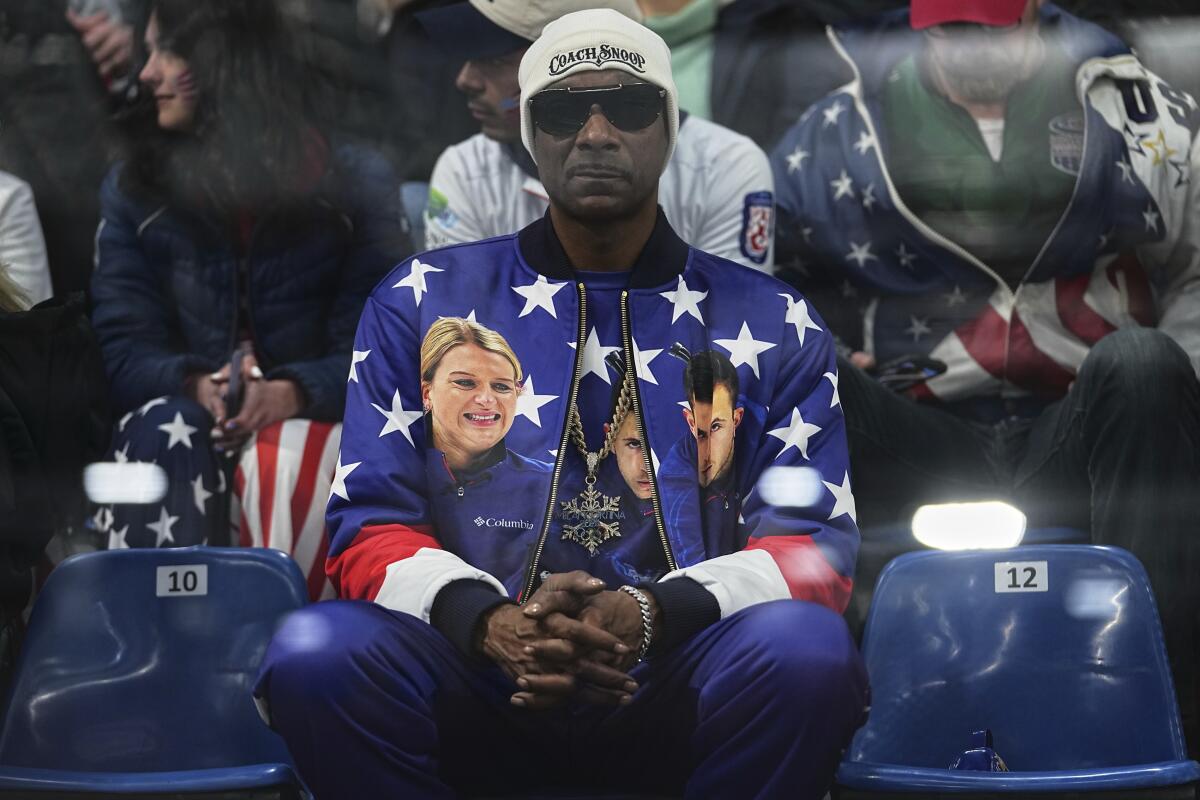U.S. continues to win gold medals at Milan-Cortina Olympics
Welcome to your daily review and preview of this year’s Milan-Cortina Olympics. My name is John Cherwa and I’m your tour director for the Games as the U.S. surpassed the gold total of its last five Winter Olympics early Saturday. The U.S. men’s hockey team could add to that mark.
It’s been two pretty good Olympic hockey tournaments. And the U.S. could win both of them. On Friday, the U.S. men beat Slovakia, 6-2, in the semifinals and will meet Canada for the gold on Sunday. The better game was Canada and Finland. Our once-friendly neighbor to the north fell behind 2-0, tied the game with 9½ minutes to go and then won with 35 seconds left. We’ll preview that game more tomorrow.
And, who can forget the U.S. women beating Canada, 2-1, in overtime in a gold-medal quality game.
The ninth gold for the U.S. was in the men’s freestyle halfpipe Friday when, as we predicted in yesterday’s newsletter, Alex Ferreira got the gold on his last run. It completed the lifetime gold, silver, bronze trifecta for the 31-year-old from Colorado. The U.S. also had the bronze until the last run when Nick Goepper was bumped to fourth.
The only other U.S. medal of the day was Corinne Stoddard’s bronze in the women’s 1,500 meters in short track speed skating. South Korea was first and second. The Netherlands won the men’s 5,000 relay. The U.S. did not make the finals.
It’s kind of a light day, so let’s do some random thoughts on the TV coverage.

Snoop Dogg attends mixed doubles curling in Cortina d’Ampezzo, Italy, on Feb. 6.
(Fatima Shbair / Associated Press)
- Snoop Dogg was fresh and exciting in Paris. The act isn’t as fresh or exciting in Italy. Snoop and buddy Martha Stewart remind me of CBS’ Gayle King’s unofficial “I’m Privileged and You’re Not Tour” where she goes to awards shows, Broadway plays, Jeff Bezos’ wedding, Bad Bunny in Puerto Rico and into “space.” Well, Snoop and Martha seem almost as privileged, getting into all the best places that you or I couldn’t. Just saying, for a reported $500,000 a day for Snoop, it wasn’t as good as Paris. No idea how much Martha is making, but she’s not likely being paid in garden vegetables.
- I’ve heard the Captain and Tennille’s “Love Will Keep Us Together” more times the last two weeks than in all of 1975, when it was No. 1 for four consecutive weeks.
- Do you think an NBC executive made the wrong decision to put the women’s figure skating on NBC and the U.S.-Canada women’s hockey game on USA? I do. You could have shown the game, use the time between periods to cut to the figure skating and it would seem as if you had the pulse of the Games. And the hockey game was over before the medal skaters took the ice.
- Tara Lipinski and Johnny Weir on figure skating get our vote for best analysts.
- Kenny Albert (hockey) and Dan Hicks (skiing) have been the best play-by-play announcers.
- Did you know that most of the Games are being called from Connecticut and not Italy? Sports called from stateside are curling, biathlon, cross-country skiing, ski jumping, Nordic combined, speedskating and most freestyle skiing. And a lot of the studio shows were also from Stamford. (In fairness, this newsletter is being done from Florida. But Thuc Nhi, Sam, Kevin and Robert are in Italy.)
- The Games have been a ratings success for NBC with numbers almost double what they were in 2022 in Beijing. The time difference between the U.S. and Italy was six hours and it worked to the benefit of U.S. viewers.
- Mike Tirico is very good at whatever he does. Glad to see they gave him some afternoon time.
- When Hoda Kotb interviewed the “Blade Angels” on Friday, I told those around me she would tell them that she loved them. I was right.
Best Thing to Watch on TV today
- The gold medal chances of the U.S. women’s curling team died on the last shot in the last frame when Switzerland, holding the hammer, knocked the U.S. rock out of the house and got two points to win, 7-4. Switzerland will now play Sweden, a 6-3 winner over Canada, for the gold while the U.S. will play Canada for the bronze. On the men’s side, Switzerland won the bronze by beating Norway, 9-1. Britain plays Canada for the gold.
- No surprise that Norway picked up a gold and silver in the biathlon men’s 15-kilometer mass start. Campbell Wright of the U.S. was 29th.
- Besides the U.S. gold in freestyle skiing halfpipe, Germany won the women’s ski cross. The U.S. did not make the final. And, China got gold and bronze in the men’s aerials. Christopher Lillis was the top U.S. athlete in eighth.
Favorite photo

U.S. forward Jack Eichel celebrates after scoring in the second period of a 6-2 win over Slovakia in the men’s hockey semifinals Friday at the Milan-Cortina Winter Olympic Games.
(Robert Gauthier / Los Angeles Times)
Times photographer Robert Gauthier is at the Winter Olympics. Each day, Times newsletter editor Houston Mitchell will select a favorite photo from the many Gauthier has taken.
Saturday’s Olympic TV and streaming schedule
MULTIPLE SPORTS
8 p.m. — “Primetime in Milan” (delay): Cross-country skiing, bobsled, figure skating, freestyle skiing and more. | NBC
BIATHLON
10:30 a.m. — 🏅Women’s 12.5-kilometer mass start (re-air) | USA
BOBSLED
8 a.m. — Four-man bobsled, runs 1-2 | USA
10 a.m. — Two-woman bobsled, Run 3 | NBC
12:05 p.m. — 🏅Two-woman bobsled, final run | Peacock
12:15 p.m. — 🏅Two-woman bobsled, final run (in progress) | NBC
2:15 p.m. — Two-woman bobsled, runs 3-4 (delay) | NBC
CROSS-COUNTRY SKIING
8:30 a.m. — 🏅Men’s 50-kilometer mass start classic (delay) | NBC
CURLING
🏅Women’s bronze-medal match
5:05 a.m. — U.S. vs. Canada | Peacock
7:20 a.m. — U.S. vs. Canada (delay) | USA
🏅Men’s gold-medal match
10:05 a.m. — Britain vs. Canada | CNBC
Women’s bronze-medal match
1 p.m. — U.S. vs. Canada (re-air) | CNBC
FIGURE SKATING
11 a.m. — Exhibition gala | Peacock
11:55 a.m. — Exhibition gala (in progress) | NBC
12:50 p.m. — Exhibition gala (in progress) | NBC
FREESTYLE SKIING
8:45 a.m. — 🏅Men’s skicross, finals (delay) | USA
9:15 a.m. — Mixed team aerials, final (re-air) | USA
10:30 a.m. — 🏅Women’s freeski halfpipe, final | NBC
1:30 p.m. — Mixed team aerials, final (re-air) | NBC
HOCKEY
🏅Men’s bronze-medal game
11:40 a.m. — Finland vs. Slovakia | USA
SPEEDSKATING
6 a.m. — 🏅Men’s and women’s mass start, semifinals and finals | Peacock
7 a.m. — 🏅Men’s and women’s mass start, semifinals and finals (in progress) | NBC
In case you missed it …
Check out the following Milan-Cortina Olympics dispatches from the L.A. Times team on the ground in Italy:
Winter Olympics Day 15 live updates: Klaebo wins record sixth gold medal
U.S. men rout Slovakia, will play Canada for hockey gold medal
After shedding pressure, American Alysa Liu rides wave of joy to Olympic gold medal
‘A magical moment.’ Hilary Knight caps off U.S. women’s hockey career with Olympic gold
Olympians Hilary Knight and Brittany Bowe get engaged before gold-medal hockey match
Jordan Stolz takes silver in Olympic 1,500 meters; China’s Ning Zhongyan wins gold
U.S. bobsledder Azaria Hill adding to her family’s rich Olympic Games legacy
Until next time…
That concludes today’s Sports Report Olympic Edition newsletter. If you have any feedback, ideas for improvement or things you’d like to see, email newsletter editor Houston Mitchell at houston.mitchell@latimes.com. To get this newsletter in your inbox, click here and select the Sports Report.



